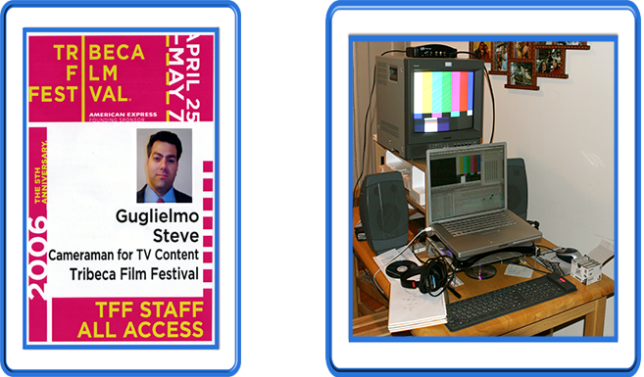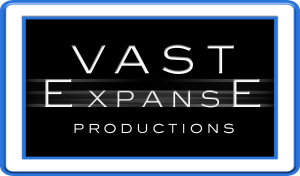June, 2005. Two days after celebrating my third wedding anniversary, I walked out of the offices of ASME for the last time. Three years of producing quality work discounted by an executive director’s ill-conceived notion of progress. New logo, new website, downsize half the company and no need for rich media content to promote the organization in this new direction. The protests of a number of highly respected former presidents on our behalf fell upon deaf ears. Our own department head took a buyout and jumped ship a month before the axe swung. So you can see how this could have a serious impact on one’s self worth and identity. Every day of that last month was a surreal experience. As I continued doing my job and walked through the different departments, the sorrowful expressions made me feel like there was a sign hanging over my head: “Dead Man Walking.”
At this point, I had picked up my first professional video camera and used it mostly to shoot my wife’s music department’s high school concerts. A connection gave me an opportunity to shoot for an organization affiliated with the Tribeca Film Institute. This led to working camera at the festival shooting content for the website’s daily highlights. So I shot Robert De Niro opening the festival, red carpet interviews with Kurt Russell, Rosie Perez and Jimmy Smits, press conferences with John Malkovich and Morgan Freeman and Martin Scorsese introducing a film before its screening. I recall being the only one reporting to the festival every day in a suit. It drew stares from my (casually clothed) colleagues, but I didn’t care. Call me “old school,” but if you want to be respected, you need to be presentable. The festival’s producers did treat me differently and whenever I showed up to shoot a panel discussion, I was often mistaken for a panel guest! My identity as “shooter” was pretty solid after that. I wasn’t paid money for my two weeks of work, but was given a much more valuable gift that would get me fully back into production mode again: Final Cut Studio.
I needed a project to fully immerse myself in to get up to speed and comfortable with the software. So I documented a mentoring program my wife’s choral students participated in with the Collegiate Chorale from beginning rehearsals to stage at Carnegie Hall performing “The Lord of the Rings Symphony.” When I completed the half hour documentary, I didn’t want to call it “A Steven Guglielmo Production.” That’s when Vast Expanse Productions was born.
I was hoping to air it on the local PBS station, but the rights to the “The Lord of the Rings” music was an issue that the Collegiate Chorale’s lawyers promised to handle. They never did. At least it’s a memento for these talented students to keep and relive this special moment in their musical growth. After this experience, I felt I was fully back to my “videographer/editor” identity. Just in time.
The Senior Producer who was laid off with me had become a Producer at IEEE (Institute of Electrical and Electronics Engineers) and had the opportunity to build an internet TV network (IEEE.tv), exactly what ASME needed to do to promote their organization. Needing to produce a large number of new programs each month, I found myself working steadily as an independent contractor for IEEE.tv for many years.
But, as in many things in life, “Nothing Gold Can Stay.” New management brought that chapter to an end. So how do I sell myself now that the demands from twenty years prior to “focus on one thing” has evolved to “being ALL things?”
The answer first came to me when I moved and became a freelance photographer for the “Glen Cove Patch.” I had to produce a local story each week and covered a Jewelry Workshop. As I watched and shot students taking raw materials and heating, bending, twisting, hammering and shaping wire and pieces of metal into beautiful works of art, I finally made the connection. They were crafting these raw materials into wearable art. I take ideas, concepts, and scripts and craft them into a visual experience for everyone to see. . . I am a Cinematic Craftsman!
I loved it, but was afraid to use it because it sounded different, weird. So I put it in the back of my mind until I stumbled upon an online revolution called Creative Live. The first class I saw was Ann Rea’s “Make Money Making Art.” The first part discussed how you introduce yourself to others and how pointless it is to just say, “I’m a painter” or “I’m a photographer.” Those titles explain the medium being used but not the value being offered. But to say, “I can craft a cinematic experience for you,” not just point, shoot and document what you’re doing, I’ve just clearly defined what I offer. At least it may provoke the follow up question, “Wow, what is that?”
I was still a little hesitant until Creative Live brought Michael Port’s wisdom to me when he explained that you need to decide how you’re known to the world, don’t let other people do it for you. And the enthusiastic approval of my high school art teacher with whom I’ve continued a friendship for 30 years made it all seem right.
So if you ever happen to be within earshot when someone asks what I do, you will hear, “I’m a Cinematic Craftsman.”
[fbcomments]



